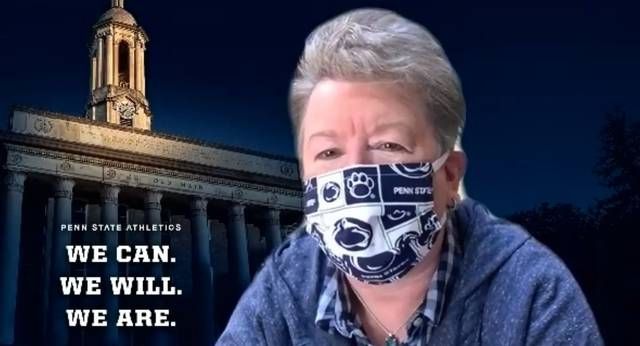
Penn State athletic director Sandy Barbour opened a video call with reporters Wednesday wearing a mask to advocate their use.
Penn State Athletics
Click here to subscribe today or Login.
The early results are encouraging for Sandy Barbour and her department.
Penn State’s athletic director said Wednesday that of the 102 athletes who have been tested for the coronavirus upon their return to campus, none have come back positive.
Now comes the tricky part — keeping that number as low as possible as the university prepares to resume classes in August and, perhaps, play football in September.
“We determined we would test upon return for all student-athletes and staff, and then test as symptomatic,” Barbour said on a video call with reporters. “That’s our protocol for the summer, and we’re continuing to look at the science and the conditions around us. And as the university settles on what they’re going to be doing for the fall, certainly, fold up under that as well.”
Moving forward, Barbour said the school will release updated testing results every two weeks as more students return. The first phase began on June 8 and included 75 football players who quarantined themselves for a week while awaiting test results before being allowed to participate in voluntary workouts.
Nittany Lions coach James Franklin said last week in an interview on ESPN’s “Golic and Wingo Show” that at the time, there were about 30 players on his roster who had yet to return, only six of whom were on scholarship.
Both Franklin and Barbour have reiterated that any player who does not feel comfortable returning for the fall would not be in danger of losing their scholarship.
And those that have come back will not be required to sign any type of waiver absolving Penn State of liability in the event of illness.
Instead, players will be asked to follow a non-binding set of rules, as will the rest of the student body that comes to campus.
“We do have what we are calling our ‘One Team Pledge’ that all of our student-athletes and coaches eventually will sign,” Barbour said. “All that is a reiteration of all the educational stuff, all of the protocols, and an acknowledgement of the importance to themselves, their teammates, their coaches and how important following these protocols are.”
Other programs across the country are dealing with outbreaks on their rosters, with a few electing to shut down voluntary workouts as a precaution.
“There’s no doubt there’s been a little bit of pessimism in the last couple of weeks that we really hadn’t had in four to six weeks,” Barbour said. “We had been ticking up on the optimism scale. It’s part of the ebb and flow of the virus.
“Obviously, my hope is that as people start looking at the masking and social distancing again and all of the precautions and maybe recommitting to the seriousness of this, that we’ll see it flatten out.”
Preventing the spread of COVID-19 will be essential if there is to be a football season as scheduled. For now, players are working out in small, supervised groups. Starting July 13, the coaching staff can begin working with them in person before leading up to regular practices in August.
The Lions’ opener is set for Sept. 5 against Kent State. If that game is played as scheduled, Beaver Stadium won’t be anywhere near capacity, and Penn State is not planning on selling single-game tickets.
“I can say with certainty that without a season ticket, no matter what our capacity is, you’re probably not coming to a Penn State game this year,” Barbour said. “I appreciate our fans and their fanaticism for Penn State football. We hope to be able to reward them with a safe and healthy opportunity to come and watch Penn State football this year.
“The different scenarios we’re looking at would be to try to accommodate as many of our season-ticket holders as we possibly can.”
It’s all part of an extremely difficult balancing act between safety and economics. Barbour said that although her department has avoided any furloughs thus far, “pay reductions are probably unavoidable” in the near future.
Several major schools, including Michigan in the Big Ten, have already announced one-year paycuts for top coaches and administrators in order to make the numbers work.
Penn State’s athletic department is able to support 31 varsity sports without any funding from the university predominately because of the revenue brought in by football. Beyond that, the school and the surrounding area of State College and neighboring towns depend heavily on a season being played.
Barbour said “it would be a mess” if the season were to be canceled or shortened for any reason. She also said that moving the games to the spring semester would only be done “as a last resort.”
But in the end, it will be the virus — and how seriously people treat it — that determines the fate of college football.
“Whatever it is that we’re going to do, we’re going to do it only if it’s safe and healthy,” Barbour said. “Given the uncertainty, we’ve had to work on a lot of plans, a lot of different scenarios.
“If it’s healthy and safe to (play), we’ll obviously do it. If it’s not, we won’t. … Yes, there would be a significant financial ramification to it. But none of it is worth risking the health and safety of our students and coaches, staff and community.”




